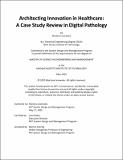| dc.contributor.advisor | Rubin, Joan | |
| dc.contributor.author | Jezewska, Martyna | |
| dc.date.accessioned | 2025-08-27T14:32:03Z | |
| dc.date.available | 2025-08-27T14:32:03Z | |
| dc.date.issued | 2025-05 | |
| dc.date.submitted | 2025-06-20T18:51:31.880Z | |
| dc.identifier.uri | https://hdl.handle.net/1721.1/162537 | |
| dc.description.abstract | The Mayo Clinic, a renowned non-profit organization, has long been at the forefront of healthcare innovation. This thesis explores the implementation of digital pathology within the Mayo Clinic, focusing on its potential to enhance diagnostic accuracy, increase efficiency, enable remote collaboration, and ultimately improve patient care. By leveraging the Architecting Innovative Enterprise Strategy (ARIES) framework, this research provides a comprehensive analysis of the socio-technical aspects of digital pathology implementation. The study begins with a literature review on innovation and its application in healthcare,
followed by an in-depth case study of the Mayo Clinic's journey with digital pathology. Key findings highlight the importance of organizational design, stakeholder engagement, and continuous improvement in successfully integrating digital pathology into existing healthcare systems. The research concludes with recommendations for future innovations and insights on how healthcare institutions can better prepare for and adapt to disruptive technologies. | |
| dc.publisher | Massachusetts Institute of Technology | |
| dc.rights | In Copyright - Educational Use Permitted | |
| dc.rights | Copyright retained by author(s) | |
| dc.rights.uri | https://rightsstatements.org/page/InC-EDU/1.0/ | |
| dc.title | Architecting Innovation in Healthcare: A Case Study Review in Digital Pathology | |
| dc.type | Thesis | |
| dc.description.degree | S.M. | |
| dc.contributor.department | System Design and Management Program. | |
| dc.identifier.orcid | 0009-0007-4042-1642 | |
| mit.thesis.degree | Master | |
| thesis.degree.name | Master of Science in Engineering and Management | |
